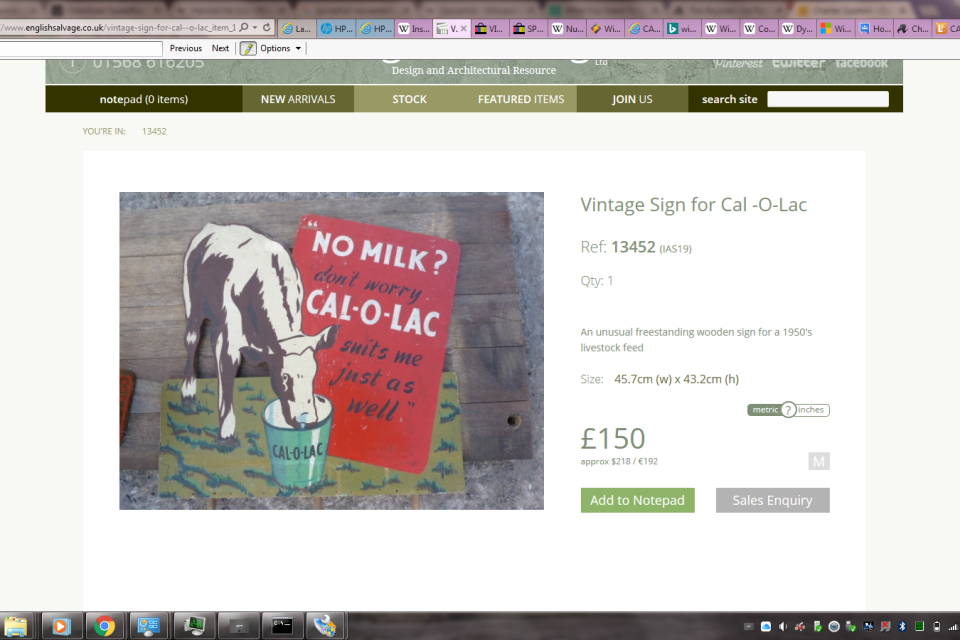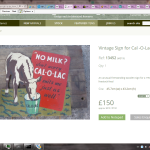The Miller’s Tale – Episode 3

(1) A BLAST FROM THE PAST –

I mentioned that my father had devised a milk replacer food for baby calves. It was government policy during the war and for a long time afterwards that as much milk as possible should go fresh to the consumer. This preserved the maximum nutrition and vitamin content. Synthetic vitamin supplements were not available. All raw materials and foodstuffs were in short supply and generally rationed. So a product which allowed the farmer to sell more of his milk for human consumption was officially favoured. When raw materials were available, it could be sold without ration coupons at a cost which was a fraction of the price the farmer would get for his milk. In April 1944, our firm registered the trade mark CAL-O-LAC for this product. It was my mother’s idea. So our small firm went on to produce a significant proportion of this niche product nationally.
The artist’s impression of the Ashbourne Road Mill appeared in the 1953 Coronation edition of the Derbyshire Advertiser and you can see a logo of a calf drinking out of a bucket but the artist omitted the word “Cal-O-Lac” from beneath it. That is the trade mark as I remember it, after father employed a London advertising agent to improve the image.
(2) JANUARY 1973 – “GOING INTO EUROPE ”
We were well-prepared for the changeover to the new policy. Although the European Communities Act 1972 did not receive Royal Assent until October 1972, MAFF (Ministry of Agriculture Fisheries & Food) had prepared us well, so we entered the strange new world on January 1st 1973 where prices of key ingredients were fixed politically and our profitability would depend on collecting the EEC subsidy for making wheat and milk powder unfit for human consumption by incorporating them into animal feeding stuffs.
This was an extremely prosperous time for farming. It went on unfettered for twelve years. Prices were fixed at levels to keep small French peasant farmers happy and our much larger, more efficient farms could scarcely avoid doing very well indeed. The EEC guaranteed to buy everything they could produce and this created the grain, beef, butter and milk powder mountains – more than we could “denature”(the technical term) in animal feed. So it was dumped at even lower prices on the world market, putting farmers in the Commonwealth and Third World out of business.
As our farmer customers – with a guaranteed market for everything they could produce – were doing well, so did we. Not a few people asked why I was grumbling about it. “Because it’s wrong” was my answer. The housewife and the taxpayer were paying far more to make food dear than the taxpayer had previously paid to keep a secure supply of home-grown food.
(3) THE NEW OFFICIALS
The new system needed careful supervision to make sure that people were not cheating – claiming the “denaturing” subsidy and then selling the wheat or milk powder back as human food at full price. So a new breed of official was required. One sensible thing which MAFF did was to invite a number of people from the trade to become civil servants and supervise the inspectors.. They had done the same when wartime controls were introduced and it gave us some confidence that officialdom would understand its task.
As ours was one of the first mills to be fully equipped, we had an arranged visitation by twelve of the new inspectors who were being trained. They came from all sorts of previous jobs within the civil service and this was the first time many had seen the feed milling process. Eventually one was assigned as our regular inspector, a man whose previous experience was entirely clerical or administrative.
He was very awkward and ill-mannered. He managed to upset everybody from the mill foreman to the girls in the office. So eventually I phoned up the supervisor, a man from the trade who often wore rather flamboyant bow ties and matching pocket handkerchiefs. “ I say, can you call your dog off?” I asked “This chap’s upsetting everybody”.
“Leave it to me, dear boy” he said and we got a replacement inspector, a man who had worked in the real world as a pest control officer. He had a couple of grand Jack Russell Terriers in the back of his car. I knew instantly that we would hit it off.
He was efficient, meticulous and rigorous in going about his business. After about three months, he said “I am going to show you something and, if you say you’ve seen it, I will deny it completely”. He showed the reports of the previous man who had convinced himself that we were crooks, cheating the system – but he couldn’t put his finger on it and that had driven him crackers. The report was an Official Secret which we were not entitled to see. If acted upon, it could have ruined our business. Our subsidy could have been held up for months, destroying our cash flow, and we would not have known why. “I know this isn’t right” he said “I am going to write another report now. You won’t see that” and we never had any problems after that. This was the sort of conduct people expected of MAFF. As a department it enjoyed the deserved confidence of the farming community and industry.
The Old Order Changes
Probably the most individually influential of its civil servants was Sir Emrys Jones, who was chief adviser to the Minister from 1967 to 1973. I can’t remember a Minister of Agriculture having a “special adviser” – a party political appointment – in those days. Sir Emrys enjoyed the confidence of five of them regardless of party – Christopher Soames, John Hare, Fred Peart, Jim Prior and Cledwyn Hughes. Sir Emrys was very much a muddy boots and hands-on civil servant, who spent as little time in Whitehall as possible. He came from a hill farming family in Wales, as did quite a number of senior MAFF civil servants in those days. We sometimes called them “The Taffia”. They were formidable.
I only got to know him after he resigned in 1973 in despair at the introduction of the European Common Agricultural Policy which, he said, would cause farmers to grow “the wrong crops in the wrong places at the wrong times”. He came to talk to a group of us feed technologists just after he had started as Principal of the Royal Agricultural College Cirencester. I asked him how he liked his new job. “Man” he said “If it wasn’t for the bloody students and the bloody governors, the job would be bloody perfect!” His enthusiasm was infectious.
A similar character from Wales was appointed to enforce the new regulations to control the use of medicines in animal feeds. As with our introduction to the CAP, the guidance and information were first class. He placed a great emphasis on the co-operation and help which they wanted to extend to the trade. His authoritative summing up suggested a non-conformist Chapel background. “ But if you stray from the paths of righteousness, be sure we will find you out – and our vengeance will be terrible!” It was said with a twinkle of humour – like the glint of sunshine on steel. Their successors were more of the inflexible, humourless, tickbox variety, like the first inspector of the new breed we had chanced to meet.
COMING SHORTLY – MR WILSON’S “FUNDAMENTAL RENEGOTIATION”





